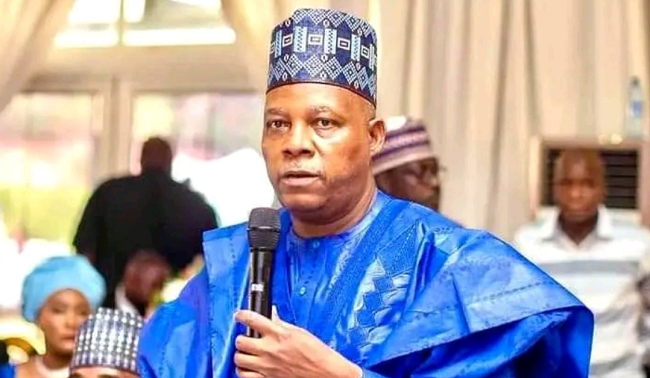The Federal Government says the Special Agro-Industrial Processing Zone (SAPZ) is a strategic milestone in its plan to industrialise Nigeria’s agriculture sector and create sustainable jobs across the country.

Vice-President, Kashim Shettima, said this while performing the groundbreaking for the construction of Phase 1 of the SAPZ project in Kaduna on Tuesday, April 8, 2025.
The SAPZ is part of a larger national programme, with Kaduna, Kano, Kwara, Cross River, Imo, Ogun, Oyo, and the Federal Capital Territory (FCT) among states in the first phase of the project.
It aims at transforming Nigeria’s agriculture through innovation, private-sector investment, and strategic public partnerships.
The zones are designed to create agro-industrial hubs that integrate farmers with processors, reduce post-harvest losses, and expand rural economic opportunities.
The facility is located in Daki-Takwas, along Kaduna-Abuja, Expressway, Chikun Local Government Area of Kaduna State,
Shettima said the project was a direct response to the long-standing challenges facing Nigeria’s agricultural value chain, including poor infrastructure, limited access to markets, and low value addition.
He expressed confidence that the initiative would catalyse economic growth by creating thousands of jobs and empowering Nigerian youths.
“We are not just breaking ground. We are building the infrastructure to feed our people, empower our youth, and fulfil the economic promise of our nation.
“This is not just about bricks and mortar. It is about people.
” It is about the resilience of our farmers, the ingenuity of our entrepreneurs, and the commitment of our government to build a future that works for everyone,” he said.
According to Shettima the nation cannot afford to be chained to outdated systems while the world moves with urgency towards innovation.
He said the SAPZ initiative was a strategy that “lays the foundation for real economic transformation.”
Shettima praised the Kaduna State Government for its leadership in agriculture, describing the state as a key driver of Nigeria’s agro-industrial future due to its abundant arable land and historical role in agricultural production.
“Kaduna is not a stranger to agricultural leadership. What we are starting here today will become a model for other states to follow,” he said.
The vice-president reiterated the importance of involving young Nigerians in the agricultural revolution.
“The SAPZ will generate thousands of jobs and equip the youth with the skills to become active players in the economy.
“The youth of Nigeria must not be spectators. They must be stakeholders and shapers of their own futures,” he said.
Earlier, Kaduna State Governor, Sen. Uba Sani, described the SAPZ as a strategic investment designed to accelerate industrial development across Nigeria.
He said, “The SAPZ is a huge investment designed to position Kaduna State as a major player in Nigeria’s industrial development.”
According to Sani, agriculture plays a central role in Kaduna’s economy, contributes 42 per cent to the state’s Gross Domestic Product (GDP) and employing 60 per cent of the state workforce.
“In the 2023 budget we inherited, agriculture received just N1.4 billion. However, in 2024, we increased it to N23.4 billion, and in 2025, we have approved N74.2 billion,” he said.
Also, the AfDB President, Dr Akinwumi Adesina, applauded Kaduna’s commitment to the actualisation of SAPZ, highlighting the significance of agricultural industrialisation in the state’s economic growth.
While restating the bank’s commitment to the project, he said the initiative was currently being implemented in 27 sites across 11 countries, including Côte d’Ivoire, Ethiopia, Senegal, and Madagascar.
Also speaking, the Minister of Agriculture and Food Security, Sen. Abubakar Kyari, described the initiative as a turning point in Nigeria’s agricultural history.
“This programme will be a game changer. It is designed to attract private sector investment in agro-industrial processing, drive value addition, and enhance rural development.
“It will strengthen Nigeria’s agricultural ecosystem to respond favourably to the challenges of our time,” the minister said.
The SAPZ programme is being implemented with support from international development partners, including the African Development Bank (AfDB), the Islamic Development Bank (IsDB), and the International Fund for Agricultural Development (IFAD).
The groundbreaking was witnessed by government dignitaries, stakeholders and partners who commended and pledged commitment to the project.
By Lucy Ogalue
